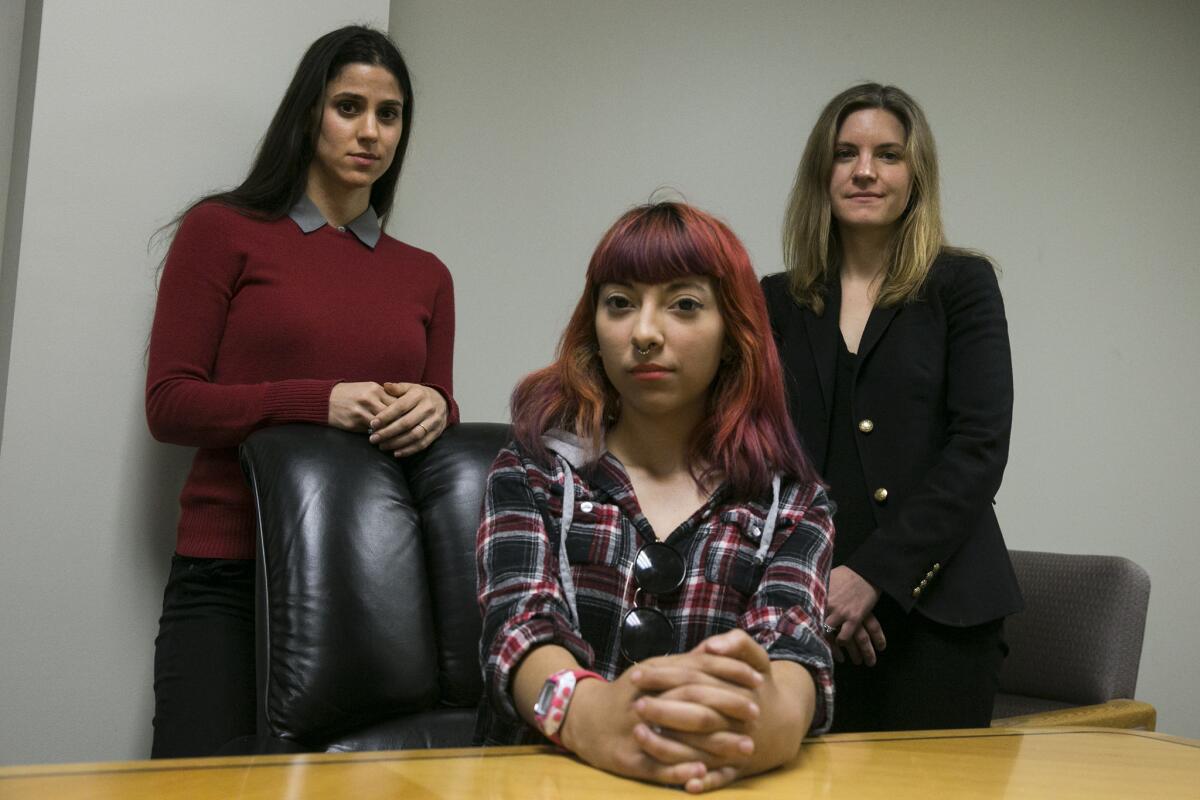Compton Unified sued for allegedly failing to address trauma-affected students

Compton Unified student Kimberly Cervantes, center, is part of a groundbreaking class-action lawsuit seeking academic and counseling services from the district, where students allegedly are suffering from extensive trauma, which research shows incapacitates learning. The lawsuit is the first of its kind in the nation. Left to right are; attorney Annie Hudson-Price, Cervantes and attorney Kathryn Eidmann.
In a groundbreaking effort to address a key underlying cause of poor academic performance, students who have suffered from violence and other trauma are suing the Compton Unified School District for allegedly failing to address their problems and provide an appropriate education, according to a class-action lawsuit filed Monday.
The lawsuit will test whether “complex trauma” qualifies as a disability under federal law, which would require school districts to offer special academic and mental health services. If successful, it could vastly expand support for scores of struggling students, especially in low-income, high-crime minority neighborhoods.
Decades of research have found that children who have suffered serious trauma are far more likely to repeat a grade, be suspended from school and have severe attendance and behavioral problems, according to Marleen Wong, an associate dean and clinical professor at the USC School of Social Work. Her 2003 study of thousands of sixth-graders in South and East Los Angeles found that nine of 10 had witnessed or experienced violence and had lower reading scores, higher absenteeism and other problems.
“If you really want to do something about the achievement gap, childhood trauma is the place to start,” said Mark Rosenbaum, an attorney with Public Counsel, a Los Angeles-based pro bono law firm that filed the lawsuit along with Irell & Manella LLP.
The lawsuit is seeking training for staff to recognize trauma, mental health support for students to cope with their condition and a shift from punitive disciplinary practices to those based on reconciliation and healing.
Compton Unified Supt. Darin Brawley said he has not yet seen the lawsuit and could not comment specifically on it, but added that the district would review the allegations.
“We take very seriously all allegations regarding the quality of education of our students,” he said. “The district is committed to providing a quality education to all students and will continue to do so.”
The lawsuit, whose plaintiffs also include three Compton teachers, details the cases of several students. They include one boy, a Dominguez High junior, who has long struggled academically after suffering from physical violence and sexual abuse from the boyfriends of his mother, a drug addict. He was later placed in foster care but was kicked out of his home and began sleeping on the high school roof until he was discovered by school officials, who did not provide him any help, the lawsuit alleges.
The student said he was seized with uncontrollable anger at times, sometimes believing he has a “demon” in him.
Another student at age 8 first witnessed someone being shot and killed and has seen more than 20 other shootings since then — one of them resulting in the death of a close friend, according to the lawsuit.
Another student, Kimberly Cervantes, 18, a senior at Cesar Chavez Continuation School, said she stopped attending school for weeks at a time after multiple traumas, including being told by teachers at a different school that her bisexuality was “wrong.”
The students were kicked out of several schools but not given appropriate services to help them overcome their struggles, the lawsuit alleges.
Rosenbaum said the cost of added services to school districts would likely be more than offset by the extra state dollars to campuses if fewer students were truant, suspended or dropped out of school.
Wong said that proper services can help heal students and turn their lives around. After her study, she launched a 10-session counseling program in the Los Angeles Unified School District that proved effective in helping the students recover and perform better academically.
One student in the L.A. Unified program witnessed rebel soldiers killing villagers in his native Guatemala — then saw gang members attack his friends in Los Angeles, Wong said. He suffered flashbacks, insomnia and anger that led him to fight his classmates without understanding why, she said. His behavior resulted in punishment by school officials, including removal from the classroom.
During the program, Martin learned about trauma, how to calm himself and how to apply the relaxation techniques in his daily life, she said. Techniques included walking to school with others so as not to be alone and seeking teachers to support him.
“He went through the program and did very well,” said Wong, who formerly served as L.A. Unified’s director of mental health, crisis team and suicide prevention. “He was able to go back to school, calmed down, had fewer fights and better attendance.”
She said L.A. Unified was an “anomaly” in providing quality services for traumatized youth in at least 100 schools. But countless students in other school districts are not as fortunate, she said.
Wong added that not one four-year teacher training program in California currently includes a class on how to recognize and deal with trauma in students.
“This is really the civil-rights issue of our time for our children and their futures,” she said.
Twitter: @TeresaWatanabe
More to Read
Sign up for Essential California
The most important California stories and recommendations in your inbox every morning.
You may occasionally receive promotional content from the Los Angeles Times.











